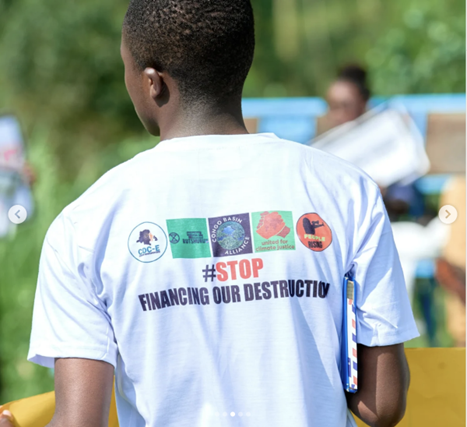Photo: Extinction Rebellion Rutshuru DRC
Dear Rebel,
Part of what makes the fight against the climate crisis feel so overwhelming is its vastness and complexity. It’s not simply about burning fossil fuels. It’s about the corporations who have something to gain in the short term and the governments that let them prosper. It’s about the laws we have and the ones we lack. The climate crisis is tied to the ways fossil fuels are baked into our lives, belongings, and occupations. It thrives on how our fractured societies justify the mistreatment of ourselves and our resources. That is to say, it is a systemic problem.
However, instead of letting that knowledge defeat us, or using it as an excuse for inaction, consider this: there are countless ways to fight back.
In the same way that the climate crisis has many causes, it will also have many solutions. As you’ll read in this month’s newsletter, different XR groups around the world are taking action in the ways that make sense in their communities.
We invite you to take inspiration from them and remember that if there is a cause that is important to you—whether it is corporate greed, local wildlife, human rights, or saving seeds—your contribution to that cause chips away at the barriers between us and a livable planet.
As always, together we are stronger.
This newsletter is brought to you by XR Global Support, a worldwide network of rebels who help our movement grow and need money to continue this crucial work.
Action Highlight

Photo: XR Misiones
29 July | San Roque González de Santa Cruz International Bridge. Argentina – Paraguay
The province of Misiones in northeastern Argentina is facing the threat of forestry extractivism, which is destroying everything in its path. The native forest is being destroyed to make way for pine plantations, generating an ecological disaster that compromises both the environmental balance and the future of local communities, including Indigenous communities living in the forest.
Arauco, a Chilean multinational, is primarily responsible for this devastation. Monoculture pine plantations are causing irreversible loss of biodiversity, altering hydrological cycles, and promoting forest fires and droughts. In addition, soil acidification and contamination from the use of carcinogenic agrochemicals used on crops further aggravate the environmental crisis.
Defending the native forest and its biodiversity is an act of justice. XR Misiones is demanding the cessation of Arauco’s activities in Misiones and a definitive stop to the pine monoculture business: enough of this extractivist model that puts business before the life and well-being of communities and nature. Watch the video of the recent action by XR Misiones and show your support by following them here.
Action Roundup
14 June | Limerick, Ireland

Photo: Extinction Rebellion Ireland
The Lower Shannon River in Ireland is a federally protected site, holding the designation of a “Special Area of Conservation” due to the presence of the only bottlenose dolphins in Irish waters, plus salmon, numerous species of lamprey, otters, mussels, and more. Despite this protection status and biodiversity, the Lower Shannon River in Kerry County is where Shannon LNG is attempting to build Ireland’s first liquified natural gas (“LNG”) terminal.
Shannon LNG, a subsidiary of the United States-based company New Frontier Energy, seeks to use the terminal to import fracked gas from the United States. Although Irish officials have not approved plans to build the Shannon LNG Terminal, in March 2025, officials granted Shannon LNG limited permission to begin planning the construction of a power plant in the Lower Shannon River area. Extinction Rebellion Ireland is working to stop Shannon LNG. Watch the video here. Follow Extinction Rebellion Ireland on Instagram.
28 July | Butembo, Democratic Republic of Congo

Photo: Extinction Rebellion Rutshuru DRC
The Franco-British company Perenco, which has been operating in the Democratic Republic of Congo for over 20 years, is now at the heart of an unbearable environmental disaster. In Moanda, in Congo Central, public health and biodiversity are severely threatened by Perenco’s oil activities, including in the nature reserve of the Mangrove Marine Park. To mark World Nature Conservation Day, Extinction Rebellion Rutshuru DRC mobilized with its allies in Butembo to demand the following:
● That PERENCO be held accountable and pay for the damage caused to the environment and local communities;
● That the Congolese government urgently review the contract binding it to this company, and if full compliance is not ensured, terminate the agreement altogether.
To learn more about the environmental issues in the Democratic Republic of Congo, follow XR Rutshuru DRC here.
Dispatch from Sydney, Australia

Photos: Extinction Rebellion Sydney
Our Red Rebels, known for their silent and symbolic performances, joined the Palestine Action Group in a national march across the Sydney Harbour Bridge on 3 August 2025. Standing with the Palestinian struggle is part of standing for climate justice, as the two are deeply intertwined. Climate change is inseparable from global systems of militarism, colonialism, and extractive capitalism, all of which intensify environmental degradation and human suffering.
The presence of the Red Rebels at this powerful protest served as a reminder that if we are serious about tackling the climate crisis, we must challenge the political systems driving both war and the destruction of our planet. In standing together across struggles, we reclaim the power to imagine and build a just and sustainable future. Follow @extinctionrebellionsydney
Positive News
International Court of Justice: States Must Protect the Environment from GHGs
On July 23, 2025, the International Court of Justice (“ICJ”) issued an advisory opinion outlining Member States’ obligations to protect the climate system and environment from anthropogenic greenhouse gases and the legal consequences for failing to meet those obligations.
The ICJ identified the applicable binding climate change treaties, customary international laws, and other applicable international laws that outline States’ obligations to the climate system and environment. Examples of those treaties and laws include: the United Nations Framework on Climate Change; the Kyoto Protocol; the Paris Agreement; the duty to prevent significant harm to the environment; the Vienna Convention for Protection of the Ozone Layer; and the Convention on Biological Diversity. Member States’ are bound only by the agreements they are signatories to, meaning States’ may have differing obligations depending upon which treaties they have assented to.
The ICJ opined that States’ breaching their climate obligations must stop the wrongful action or omission, provide assurances of non-repetition, and provide full reparation to the injured state. The Court declined to specify what the exact legal consequences would be for breaches of obligations to the climate system and environment “since such consequences depend on the specific breach in question[.]” The official summary and full advisory opinion are available here.
Must Read
At COP30 & beyond, the fight for climate justice must end corporate impunity
This commentary by Ecuadorian activist Pablo Fajardo in Mongabay hits home about how the climate crisis isn’t just about politics, but about powerful corporations getting away with serious environmental harm. Nothing new here. Fajardo delves into the saga of Chevron dumping over 60 billion liters of toxic waste deep within the Ecuadorian Amazon. Naturally, Chevron has bounced around dodging responsibility through legal loopholes, even after being slapped with a $9.5 billion court fine.
This case is a clear example of how our global systems often protect corporations instead of the people and planet. According to Fajardo, “[a]round the world, transnational corporations use Investor-State Dispute Settlement (ISDS) systems to bully governments and evade responsibility.” He calls for real change to hold these companies accountable and deliver justice for those affected.
This message is especially important with COP30 coming up in November 2025, in Belém, Brazil, right in the heart of the Amazon. COP30 will gather leaders, activists, and negotiators to confront climate issues, especially in the Amazon, head-on.
In the lead up to COP30, Brazil’s recent track record on environmental issues hasn’t been great – XR Rebels have been actioning for months to stop a “Devastation Bill” from being signed, highlighting the paradoxical nature of Brazilian leadership. We will be covering more of COP30 as the event draws closer.
Film Review
Flow
When the world goes quiet, what is left is movement, breath, and connection. Flow, the Oscar-winning animated film by Latvian director Gints Zilbalodis, proves that you do not need dialogue or even humans to tell a story that lingers long after the credits roll.
This is not your usual animated adventure. There are no talking animals cracking jokes, no catchy songs, no wise old mentor. Instead, we follow a lone black cat navigating a surreal, waterlogged world after a mysterious flood swallows the land. Along the way, it is joined by an unlikely crew, namely a capybara, a lemur, a dog, and a secretary bird, each with their own quirks, instincts, and survival skills. Together, they drift through danger, beauty, and uncertainty.
The first thing you notice is the stillness. The film is completely wordless. The characters communicate in glances, subtle body language, and authentic animal sounds. Yet somehow, you feel everything, the tension of a storm, the comfort of shared warmth, the quiet grief of loss. The lack of speech does not limit the storytelling. Instead it deepens it.
At its heart, Flow is an eco-parable, but it is never preachy. Themes of adaptability, cooperation, and resilience ripple through the narrative. It is a meditation on how fragile yet enduring life can be when the natural world is reshaped by forces beyond our control. In the age of climate anxiety, the film’s message feels timely, but it never shouts. It simply shows.
With that said, Flow will not be for everyone. Some viewers may find the slow pacing and minimal plot too abstract, preferring more conventional animated storytelling. But for those willing to surrender to its rhythm, it is a rare cinematic experience: part art installation, part fable, part survival journey.
In a year crowded with loud, fast, and forgettable blockbusters, Flow dares to drift. It invites you to listen to silence, to notice the details in motion, to feel the pull of the tide not just in the story, but in yourself.
Quick Watch
Guilt Trip: pilots torn between flight and the fight for the planet
Guilt Trip is a 15 minute documentary released by The Guardian: Documentaries which features XR activists George Hibberd and Todd Smith, members of the group Safe Landing. The film follows the two pilots as they grapple with their love for flying and the stark reality of the climate crisis and their industry’s role in increasing emissions.
Ancestors of XR

Wangari Maathai (1940 – 2011)
Wangari Maathai was born in Nyeri, Kenya. She received three advanced degrees, including a Ph.D. in Anatomy from the University of Nairobi (1971), where she taught veterinary anatomy. Professor Maathai spent her life fiercely advocating for human rights, democracy, and environmental conservation. She received 15 honorary degrees, over 50 awards from across the globe, was a board member for at least 9 international organizations, and was the founder and coordinator of the Green Belt Movement.
The Green Belt Movement (“GBM”) describes itself as “an environmental organization that empowers communities, particularly women, to conserve the environment and improve livelihoods. GBM was founded by Professor Wangari Maathai in 1977 under the auspices of the National Council of Women of Kenya (NCWK) to respond to the needs of rural Kenyan women who reported that their streams were drying up, their food supply was less secure, and they had to walk further and further to get firewood for fuel and fencing.” Since 1977, the GBM has planted over 51 million trees in Kenya.
In 2004, Professor Maathai received a Nobel Peace Prize. During her acceptance speech, Professor Maathai said, “I believe the Nobel committee was sending a message that protecting and restoring the environment contributes to peace; it is peace work. . . . I always felt that our work was not simply about planting trees. It was about inspiring people to take charge of their environment, the system that governed them, their lives, and their future.”
Professor Maathai’s contribution to humanity and the environment was immense. You can learn more about her life, work, and achievements here.
Worth a Second Look

Does Extinction Rebellion Offer Any Solutions?
We’re reviving this article from our collection of long-form blog posts because its message is still very relevant today. Extinction Rebellion focuses less on proposing specific solutions and more on inspiring urgent action. The answers to the climate and ecological crisis are out there, given to us by scientists and communities who have been calling for change for decades. Our role is to raise the alarm loudly enough that it cannot be ignored, and to push everyone from governments, to corporations, to individuals, into meaningful action. We think you’ll find this post worth a read.
Get involved in XR wherever you are! Check out our global website, learn more about our movement, and connect with rebels in your local area. Forward this newsletter to a friend. If this was forwarded to you, join us and subscribe to the XR Global Newsletter. If you have any questions or feedback, we want to hear from you. Get in touch at xr-newsletter@protonmail.com
P.S.This newsletter is brought to you by XR Global Support, a worldwide network of rebels who help our movement grow.This year our focus is on community-led action. We are empowering local groups to build capacity, identify critical targets, and devise strategies to maximise the impact of their actions. Become a recurring donor and help us fight against climate injustice – from Peru to the Congo and beyond! We need your donations for this crucial work.
Great Job Extinction Rebellion & the Team @ Ecological & Climate Change News | Extinction Rebellion Source link for sharing this story.




